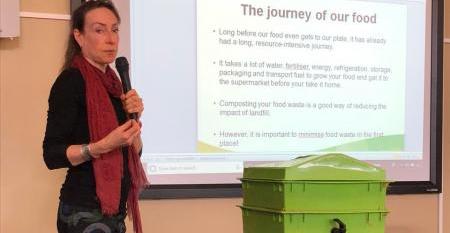
Composting Revolution
You are here

Liz Caspar
Thursday, 14 June, 2018
Liz Carter spoke about composting and worm farming. Liz is the senior sustainability officer for environment and sustainable living from the Boroondara Council. She explained the council has a large environmental team, driven by the community to run programs and initiatives to support local biodiversity. Part of this program is to encourage every household to compost kitchen waste. To do this they will subsidise the cost of a worm farm or compost bin that will be delivered to the house.
WHY COMPOST? When food scraps and other organic materials are sent to landfill, they begin to rot anaerobically. They release greenhouse gases, primarily methane (CH4), which contributes to climate change. The impact of methane on climate change is around 25 times greater than carbon dioxide (Co 2). In landfill, rotting organic matter mixes with heavy metals and other chemicals from electronics and creates a toxic sludge. Eventually, these underground toxins can make their way into the water supply. Up to 50% of household waste in bins in Boroondara consists of household waste. Composting food waste is a good way of reducing the impact of landfill.
Liz suggested everyone should look at the website www.lovefoodhatewaste.vic.gov.au to learn ways to minimise food waste in the first place.
Liz explained 3 methods used for composting, Compost Bins, Worm Farms and Bokashi Bins.
COMPOST BINS – The benefits of compost bins are being able to compost a greater variety and volume of food, including garlic, onion and citrus, as well as garden materials. It is not affected by extremes of weather.
WORM FARMS – The benefits of worm farms are good if you don’t have any garden material to get rid of or produce a lot of food scraps, but not meat, dairy, citrus or onions. They produce liquid fertiliser which is easy to harvest and apply to your garden. Worm farms need to be protected from extreme weather, they can be kept on a balcony or inside the house.
BOKASHI BINS – Bokashi composting uses fermentation to pickle food waste in an air-tight bin. Waste is broken down without odour or insects and can be kept inside the house. Waste such as meat, dairy, citrus and onion can be put into the bins. The liquid fertiliser is easy to harvest.
Liz went through the informative online Tutorial and Quiz, making note that worm farms did not handle meat, dairy, citrus or onions.
It is possible to purchase compost bins, worm farms & bokashi bins with free delivery through Boroondara Council discounted up to 40% RRP.
Liz suggested to members to look at the website www.boroondara.vic.gov.au/waste-environment/sustainability for information regarding ways to reduce green gas emissions by composting. So far 764 Boroondara households have used some form of composting receptacle subsidised by the council which equates to 111,081kg of food waste being diverted from landfill and 177,384kg of Co2 has been saved.
If any member would be interested in attending a workshop run by the Boroondara Council to learn more about working together to assist backyard biodiversity, visit www.boroondara.vic.gov.au/sustainability-events for more information.
Liz on behalf of Boroondara Council kindly donated a worm farm to raffle.








